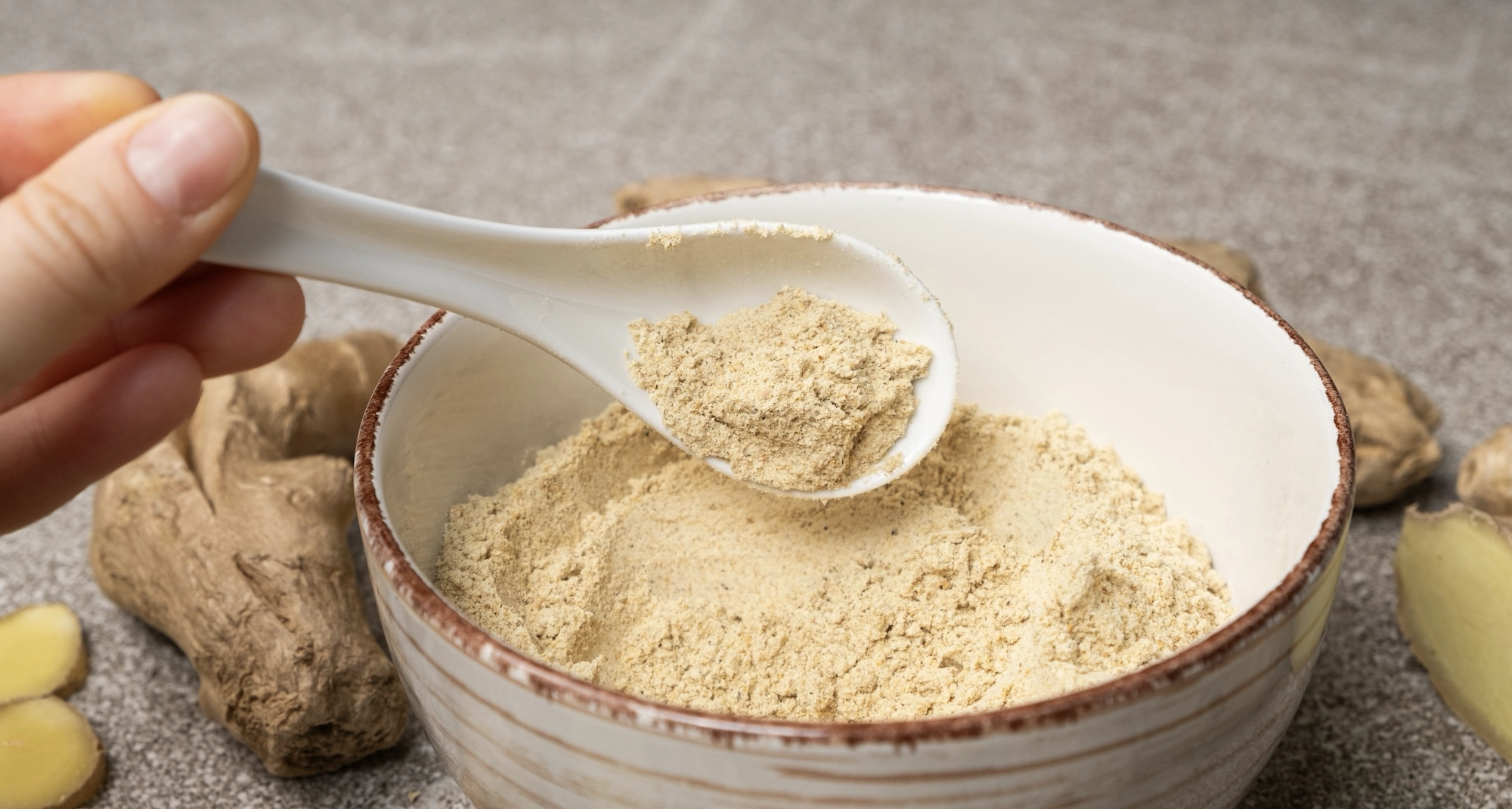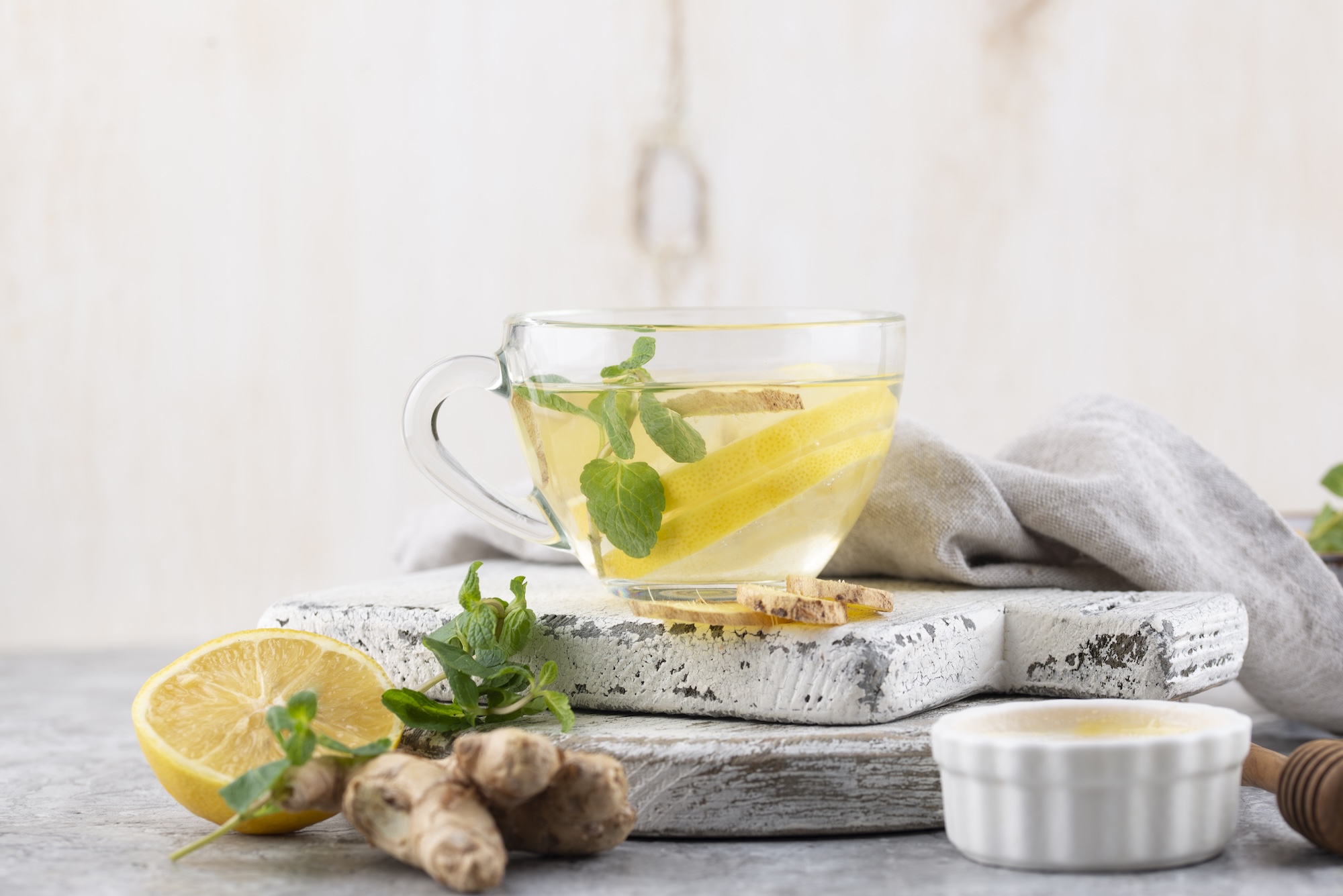The Benefits of Ginger Water
Ginger water is an herbal beverage made by boiling ginger rhizomes in water. It is widely consumed both hot and cold, thanks to its spicy flavor and distinctive aroma. Beyond providing a refreshing sensation, ginger water is well-known for its diverse medicinal properties—ranging from body nourishment and digestive relief to potential supportive therapy in various ailments according to both traditional and modern medical practices.
This article delves into the comprehensive benefits of ginger water in multiple aspects: balancing and nourishing the body, reducing inflammation, controlling blood sugar levels, aiding in weight management, alleviating nausea, easing menstrual pain, and improving blood circulation. It also includes references to reputable Thai and international research studies that confirm the scientific basis of ginger’s efficacy. Finally, it offers practical advice on consuming ginger water and key precautions to keep in mind.
Health Benefits of Ginger Water
1) Promotes Digestion and Gastrointestinal Health
Ginger has long been used as a remedy for bloating, flatulence, and indigestion. In traditional Thai medicine, ginger is classified as a “hot” (fiery) herb that helps “nurture bodily humors” and assist with digestion (Reference: 1). Clinical studies further confirm that ginger can stimulate gastric motility, enabling faster gastric emptying and reducing indigestion and gas production. Additionally, it has been used to lessen nausea and vomiting related to digestive disorders (Reference: 2).
Drinking ginger water after meals or when experiencing stomach discomfort can promote a feeling of ease due to the active components in ginger—such as gingerol and aromatic essential oils—which help reduce gas and relieve irritation in the digestive tract.
2) Assists in Weight Management and Metabolism
Ginger water is popular as a supportive method for weight control because ginger may help boost metabolic rate and reduce appetite. One study had a group of male volunteers drink hot ginger water after meals, and it was found that those who consumed ginger felt fuller for longer compared to those who did not (Reference: 3).
A meta-analysis of various studies also supports ginger’s effect on weight reduction. Participants who consumed ginger (in forms such as ginger powder, fresh ginger, or ginger water) had significantly better outcomes in terms of fat and weight reduction than those in control groups (Reference: 4). Nonetheless, to see clearer results, ginger consumption should be paired with a balanced diet and regular exercise.
3) Anti-inflammatory Effects and Pain Relief
Ginger contains active compounds with anti-inflammatory properties that can inhibit the production of pro-inflammatory agents such as prostaglandins and leukotrienes (Reference: 5). This helps reduce inflammation and pain. Clinical research has shown that regularly taking ginger extract can diminish pain associated with osteoarthritis and muscle soreness after exercise (Reference: 6).
Many people thus consume ginger water to relieve discomfort from inflammatory conditions, such as knee osteoarthritis, or to reduce muscle pain after strenuous activity. However, those with severe inflammatory conditions should still seek conventional medical treatment alongside ginger supplementation for the best results.
4) Helps Control Blood Sugar Levels
Ginger also shows potential in helping control blood sugar levels. Some studies indicate that regularly consuming ginger powder or ginger water may lower fasting blood sugar and enhance insulin sensitivity in individuals with type 2 diabetes (Reference: 7).
Research findings show that groups consuming about 2 grams of ginger daily for 8–12 weeks tended to have better blood sugar control than control groups, and also showed improvements in HbA1c and certain blood lipids (Reference: 8). Nonetheless, patients should consult a doctor before integrating ginger into their regimen, especially those on antidiabetic medications, to prevent hypoglycemia.
5) Alleviates Nausea and Vomiting
One of ginger’s most well-known benefits is its ability to reduce nausea and vomiting—whether caused by motion sickness, pregnancy, or postoperative and chemotherapy side effects. Clinical trials support ginger’s effectiveness in decreasing the severity of nausea and vomiting in various conditions (Reference: 9).
In particular, studies show that pregnant women who consume about 1 gram of ginger powder per day (for up to 4 days) can safely alleviate morning sickness compared to placebo groups. Nonetheless, pregnant women are advised to consult healthcare professionals before using ginger, as individual responses to herbal remedies may vary.
6) Eases Menstrual Pain
Several studies have found that ginger significantly eases dysmenorrhea (menstrual pain) in women, partly because its active compounds inhibit pro-inflammatory substances that cause intense uterine contractions (Reference: 10).
A meta-analysis of randomized controlled trials further revealed that women who consumed ginger powder during the first 3–4 days of their menstrual cycle experienced a significant reduction in pain levels compared to those who took a placebo (Reference: 11). In some cases, ginger’s effectiveness was comparable to NSAIDs, with fewer side effects.
7) Supports Healthy Blood Circulation
Owing to its warming quality, ginger water can help maintain body warmth and potentially enhance blood circulation. Ginger’s active components can help dilate peripheral blood vessels and reduce platelet aggregation, thus lowering the risk of blood clots that can lead to cardiovascular disease (Reference: 12).
Some research also suggests that ginger might help reduce certain blood lipids, such as total cholesterol and triglycerides, if consumed in appropriate amounts (under 2 grams per day). However, human studies are limited and show inconsistent results, so ginger should be used in conjunction with other healthy lifestyle habits.
Ginger Water in Traditional Thai Medicine
Traditional Thai medicine classifies ginger as a “hot” herb (fiery element) with various uses that date back centuries, such as easing indigestion, flatulence, colic, bloating, and even reducing nausea and vomiting (Reference: 13).
In postpartum women, some Thai practitioners recommend drinking ginger water to eliminate postpartum lochia (blood flow) and enhance blood circulation, believing that ginger’s heat can restore internal balance. Ginger is also a key ingredient in numerous Thai herbal remedies, including “Prasakarnplu,” a formula that addresses flatulence and colic.
Ginger Water in Modern Medicine
Currently, a substantial number of research articles from international journals (e.g., PubMed, NCBI) and Thai journals (e.g., ThaiJO) back the health benefits of ginger in multiple areas—anti-inflammation, pain relief, lipid and glucose regulation, and antioxidant properties. Some modern healthcare practitioners thus suggest ginger as a complementary or supportive measure alongside standard treatments.
For example, patients experiencing postoperative or chemotherapy-induced nausea, or pregnant women with morning sickness, may use ginger to help relieve nausea. Patients with osteoarthritis may also consider ginger extract to reduce reliance on NSAIDs, which often have adverse gastrointestinal effects (Reference: 14). Nonetheless, it is vital to consult a physician or specialist before using ginger for therapeutic purposes, as ginger may interact with certain medications.
Key Active Compounds and Mechanisms of Action in Ginger
Ginger is rich in biologically active compounds, including aromatic essential oils and spicy phenolic substances, which form the core of its health benefits. Among the most notable are:
- Gingerol: Found predominantly in fresh ginger; has anti-inflammatory, antioxidant, and antimicrobial properties.
- Shogaol: Formed from gingerol when ginger is dried or heated; known for its analgesic, anti-inflammatory, and possible anticancer properties.
- Zingiberene: An essential oil component responsible for ginger’s unique aroma; assists in expelling gas and relaxing the smooth muscles of the digestive tract.
- Paradol, Zingerone: Compounds produced under heat processes; exhibit antioxidant activity and may help protect cells from degeneration.
These compounds synergize to deliver ginger’s diverse health effects—reducing inflammation and pain, fighting microbes, and possibly regulating body metabolism. When you boil fresh or dried ginger to make ginger water, many of these active substances are extracted into the beverage.
How to Consume Ginger Water and Key Recommendations
1) Forms of Ginger Water
Ginger water can be prepared in many ways depending on convenience and personal preference. A basic method involves slicing or crushing 1–2 teaspoons of fresh ginger and boiling it in 1–2 cups of water for about 5–10 minutes. You can sweeten it with brown sugar or honey, or add pandan leaves for extra fragrance. Ready-to-drink ginger powders or ginger tea bags are also widely available.
Those who dislike strong spiciness may reduce the amount of ginger or dilute with more water. Some prefer iced ginger tea, which offers a refreshing taste. You can also combine ginger with lemon or orange juice for a more varied flavor profile.
2) Suitable Amounts and Frequency
Although ginger water provides numerous health benefits, it should be consumed in moderation. Generally, drinking 1–2 cups of ginger water per day (about 250 ml each) is sufficient for most individuals. Many studies recommend an upper limit of 4 grams of ginger per day for adults (Reference: 15).
Pregnant women should limit ginger intake to no more than 1 gram per day and only use it when necessary for short periods. As always, it is advisable to consult a doctor or midwife before consuming ginger water or any ginger-based product, particularly during the first trimester.
3) Precautions When Drinking Ginger Water
- Drug Interactions: Ginger may enhance the effects of blood-thinning medications like warfarin or aspirin, and could also interact with blood sugar–lowering drugs (Reference: 16). Individuals on these medications should seek medical advice before consuming large amounts of ginger water.
- Side Effects: Drinking highly concentrated ginger water or too much of it could irritate the digestive system, causing heartburn or diarrhea. Those with peptic ulcers or gastroesophageal reflux disease (GERD) should be cautious, starting with a small amount.
- Use in Pregnancy: While ginger is generally regarded as safe at low doses, pregnant women should talk to a healthcare professional prior to drinking ginger water and keep intake under 1 gram per day (Reference: 17) to minimize unforeseen risks.
- Other Health Conditions: Individuals allergic to ginger (rare) should avoid it. Those with gallstones should consult a physician, as ginger may stimulate bile secretion. People scheduled for surgery or dental procedures may need to discontinue ginger 1–2 weeks beforehand to reduce bleeding risk.
In summary, ginger water is a versatile herbal beverage with comprehensive health benefits—from general health maintenance and anti-inflammatory effects to blood sugar regulation and relief of common ailments. Both Thai and international research provide supportive evidence of ginger’s advantages for the human body. However, usage should be guided by appropriate dosage and expert advice, especially for patients with underlying conditions.
When used correctly and in moderation, regularly drinking ginger water can serve as a helpful addition to a balanced lifestyle—promoting better overall health and well-being.
References
- Department of Thai Traditional and Alternative Medicine. “Ginger: An Herbal Remedy for Enhancing Digestive Fire and Alleviating Bloating.”
- Hu, M. L., Rayner, C. K., Wu, K. L., Chuah, S. K., Tai, W. C., Chou, Y. P., … & Horowitz, M. (2011). Effect of ginger on gastric motility and symptoms of functional dyspepsia. World Journal of Gastroenterology, 17(1), 105–110.
- Mansour, M. S., et al. (2012). Ginger consumption enhances the thermic effect of food and promotes feelings of satiety without affecting metabolic and hormonal parameters in overweight men: a pilot study. Metabolism, 61(10), 1347–1352.
- Maharlouei, N., et al. (2019). The effect of ginger intake on weight and body mass index: a systematic review and meta‐analysis of randomized clinical trials. Phytotherapy Research, 33(3), 577-585.
- Grzanna, R., Lindmark, L., & Frondoza, C. G. (2005). Ginger—an herbal medicinal product with broad anti-inflammatory actions. Journal of Medicinal Food, 8(2), 125–132.
- Altman, R. D., & Marcussen, K. C. (2001). Effects of a ginger extract on knee pain in patients with osteoarthritis. Arthritis & Rheumatism, 44(11), 2531–2538.
- Daily, J. W., & Yang, M. (2015). Ginger extracts and its constituents are beneficial for human health. International Journal of Molecular Sciences, 16(6), 15625–15655.
- Akhani, S. P., Vishwakarma, S. L., & Goyal, R. K. (2004). Anti-diabetic activity of Zingiber officinale in streptozotocin-induced type I diabetic rats. Journal of Pharmacy and Pharmacology, 56(1), 101–105.
- Thomson, M., & Corbin, R. (2002). Potential therapeutic applications of ginger (Zingiber officinale) for rheumatic diseases. Nutritional Perspectives, 25(2), 28–31.
- Shirvani, M. A., et al. (2015). The effect of ginger extract on primary dysmenorrhea in teenage girls. Journal of Alternative and Complementary Medicine, 21(7), 414–419.
- Jenabi, E., Ebrahimzadeh Zagami, S., & Baboli, A. M. (2020). The effect of ginger for relieving of primary dysmenorrhea: a systematic review and meta-analysis. Nursing & Health Sciences, 22(4), 1081–1087.
- Verma, S. K., & Singh, R. P. (2008). Current and future status of herbal medicines. Veterinary World, 1(11), 347–350.
- Wuti Wutithammawet. “Ginger in Thai Traditional Medicine.” Journal of Thai Traditional Medicine.
- Ryan, J. L., et al. (2012). Ginger (Zingiber officinale) reduces acute chemotherapy-induced nausea: a URCC CCOP study of 576 patients. Supportive Care in Cancer, 20(7), 1479–1489.
- NCCIH – National Center for Complementary and Integrative Health (2022). “Ginger.” https://www.nccih.nih.gov/health/ginger
- Jiang, X., et al. (2019). Comparison of antiplatelet effects of gingerols and aspirin in rats. Phytotherapy Research, 33(10), 2756–2761.
- Vutyavanich, T., Kraisarin, T., & Ruangsri, R. (2001). Ginger for nausea and vomiting in pregnancy: randomized, double-masked, placebo-controlled trial. Obstetrics & Gynecology, 97(4), 577–582.






